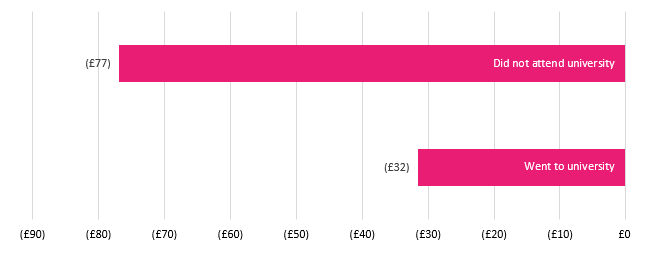Political debate around social mobility tends to describe London as a success story – but this is not the whole truth.
The SMF report published in November The Next London Challenge looks at the extent to which young disadvantaged Londoners can convert their better than average educational attainment at 16 into successful careers.
London’s Education Story
There have been major improvements in London’s education system in the last two decades. Londoners, particularly those from disadvantaged backgrounds, do very well at GCSE. However, the evidence suggests that this academic success does not always continue post 16 – as seen through lower than expected A level grades and one in ten Londoners dropping out of university (in London). [i]
London’s Labour Market
The London labour market is a mixed picture. Whilst both the rate of unemployment and median wages are higher than the English averages, the unemployment rate within the capital is closer to the levels seen in the north of England rather than the regions directly surrounding it.
Students who were living in London prior to attending university have the lowest employment rate of graduates from all English regions – this is true one, three, five and ten years post-graduation.
Table 1: Percentage of young graduates in further study, sustained employment or both by home region, one, three, five and ten years after graduation (tax year 2016/17)

Source: Department for Education (2018)
A significant number of Londoners are working in roles that do not require degrees – part of this could be due to the concentration of graduates in London. You could hypothesise that there are not enough graduate jobs to go around given regional migration. A clear majority (80%) of graduates from London are working in London post-graduation. Hence it is essential that the London labour market offers great opportunities for Londoners.
Figure 1: Higher education leavers from London in work in the UK by region of HE provider and region of employment, 2016/17
Source: HESA (2018)
Tracking Londoners from school to work
Longitudinal data allows us to track individuals educated in London (at age 16) into the labour market. To do this we use the Next Steps Survey (Waves 1 to 8, secure access via the UK data service). [ii] Using Index of Multiple Deprivation (IMD) to create two groups of deprivation (top 50% & bottom 50%).
Londoners who achieved 5 A* to C grades at GCSE (including English and Maths) were the least likely to be employed (employee and self-employed) or in education at age 25 compared to those in the other regions of England. Londoners from more deprived areas are less likely to be in employment compared to those from less deprived backgrounds, regardless of their degree status. Londoners with a degree who achieved well at GCSE are 15 percentage points less likely to be in employment compared to their advantaged counterparts.
In addition to an employment rate gap, our analysis finds a clear difference in median salaries of the two groups. There is a median wage difference of £32 per week[1] by deprivation for those who went to university – equivalent to £1,664 per year. For those without a degree the gap in median wages stands at £77 per week (£4,004 per annum).
Figure 2: Difference in gross median weekly wages by IMD at 16 and degree status (only those with gross wages), Living in London at 16 and they achieved 5+ A* to C GCSEs including English and Maths

Source: Next steps wave 8; weighted data (secure access to GCSE data)
At the upper end of the earnings scale those from less deprived areas are much more likely to be earning higher wages than those from deprived backgrounds. The wage gap between those in the 75th percentile of wages stands at £152 per week (£7,904 p/a) for those with a degree. This could signal a ceiling in the wages of highly educated disadvantaged Londoners.
This shows a clear “class ceiling” is operating in London. The full report looks at what could be contributing to and causing these differences and puts forward a range of policy to help reduce the disparities between Londoners. The gaps shown at age 26 are likely to widen as careers develops – more work needs to be conducted on how your background influences how you progress within your profession.
Click here to read the full report
[i] SMF, Building on Success (2019)
[ii] Full citation: (University College London, UCL Institute of Education, Centre for Longitudinal Studies. (2018). Next Steps: Sweeps 1-8, 2004-2016: Secure Access. [data collection]. 4th Edition. UK Data Service. SN: 7104, http://doi.org/10.5255/UKDA-SN-7104-4
[1] Rounded to the nearest pound
